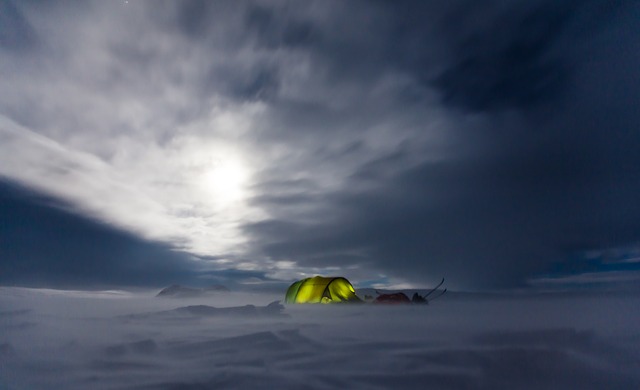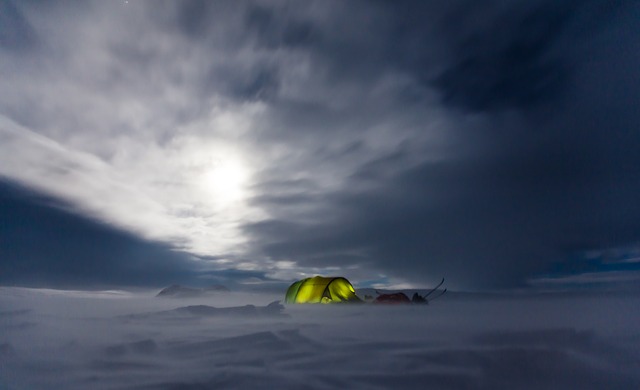What is a 4 season tent and is it worth getting one for your outdoor adventures?
In this article I will be talking about the importance of a tent that can be used in the cold, what they are REALLY used for and if you need one to use for your next camping trip.
If you’re a camper or backpacker that wants to know what makes a tent that can be used in 4 seasons, then you’re on the right page, because I’ll be covering everything that you need to know. Enjoy 😀

The Main Differences
The main distinctions between the 2 types of tents will be outlined below.
4 season tents:
- Much more wind resistant, as they have extra poles to make them sturdier
- Capable of withstanding heavy snow fall
- Have very deep-angled sides for better snow run-off
- Highly likely to contain vestibules
- Some of them do not require rain flies, while it’s not uncommon to see one that doesn’t need a footprint either
3 season tents:
- Can only withstand high winds – from a storm, not the really strong winter winds
- Can NOT withstand any kind of snow fall
- Have less-angled sides to save on the weight
- Not all of them contain vestibules, only a small few
- 99% of them contain rain flies, as the body of the tent is not actually waterproof
Basically, 3 season tents are much lighter, contain mesh walls to promote air flow, and are much easier to pitch, which is a better choice for you if you’re going backpacking and you need maximum ventilation.
So What is a 4 Season Tent?
A huge fallacy is that people think such a tent is created for ALL FOUR SEASONS, when this is not the case.
Even though it says 4 seasons, it really means winter only.
These winter tents are way too heavy and bulky for summer use, which is why they have created 3 season tents.
You can still use them in other seasons as well (summer, spring and fall), but they won’t work AS well in those seasons as 3 season tents will.
The walls on 4 season tents are mesh-free (most of the time) and created with strong, thick material to provide the best wind/snow protection while keeping you as warm as possible.
The best thing about these tents is that they can protect you from really heavy winds, ice, snow, and even hail – whereas 3 season tents can not.
To recap
A 4 season tent is best used for winter – ONLY, and if you use it for any other season, you’re just making it difficult on yourself.
The Ventilation
Even though they don’t contain mesh walls, that’s not to say they don’t offer good ventilation, because they absolutely do!
A good 4 season tent will mean no frost will get built up inside of it – on the walls or roof.
The moisture that comes out of your mouth when you breath will stick to the sides (and roof) of the tent – and this will actually turn to frost if the tent doesn’t have good ventilation.
Furthermore, there’s a possibility for your body-heat to warm up the entire tent and actually MELT the frost, causing all the moisture to drip on you.
This is exactly why you’re more likely to get condensation built up in the winter time
Why A Vestibule Is Highly Important
As you’re out exploring the wilderness, over time your backpack accumulates snow – and when you come back to your campsite to rest for the day, you need to ensure absolutely NO snow is going to get inside your tent.
When you get snow inside your tent, it’s just a matter of WHEN it’s going to promote faster internal frost buildup, which is why you should be brushing out all snow that makes its way into the tent.
That’s exactly why a vestibule room is important – it provides a place for you to store your gear outside of the tent, eliminating the need for internal frost to buildup altogether.
Not to mention that they stretch RIGHT OUT, almost completely to the ground to ensure snow packs down on them, giving you much more stability and the best protection against the elements.
Keep in mind – I do not recommend a 4 season tent that doesn’t contain a vestibule room, you’re just setting yourself up for a disaster.
When Do You Need To Use A 4 Season Tent?
You’re going to need a tent like this if you’re camping in places where it will be snowing, or it’s very cold, or there is just really heavy winds – so basically, winter time – ONLY.
You do not need a 4 season tent if you’re planning on camping during the summer, fall, or spring – as these types of tents are just way too heavy and will cause to you overheat due to the super-thick fabric.
If you’re looking for a rule of thumb, here it is:
A tent for 4 seasons should be used when you want warmth and strength, protection from strong winds, blowing sand, and cold temperatures – basically, the ability to stand strong in extreme weather conditions.
Whereas a 3 season tent is best used for camping in warmer months, since it has great venting options for increased air flow, and they have no problems standing up against average winds, rain, and even some light hail or cold weather either.
Essentially, the 4 season tent will handle it ALL – everything, while a 3 season tent will provide the basics, but sacrificing strength and extra protection for lighter materials.


This reminds me of the way companies market tires. All season tires are not good in all seasons. They are for summer only. Up here in Canada I never drive in the winter without snow tires. All seasons are for spring and summer. Terrible the rest of the time. Your all season tent works the same way. Thanks for that great distinction. I never would have known. Thanks for this, really well done.
Wow, I didn’t even know that. You learn something everyday I guess 🙂 They really do work the same, I agree. Although I wish companies would just called them by what they are used for in my honest opinion.
They should call them winter tents, just to stop any confusion from happening.
Thanks for the great comment 🙂
Hey Brandon,
Nice and informative article. Thank you. I have to confess I’m not much for camping. In fact, I think I’ve only been once but your description of the two types of tents was great. As I was reading the article and before I actually got to the part where you suggest that 4 season tents are mostly for winter, I had already made up my mind that if I ever went camping I would not use the 4 season tent unless it was winter. It’s clear that it’s too heavy to carry around when you don’t really need that much protection in other seasons. Also, although it has ventilation I still think that it would be too hot for summer months, so you are right, it’s best to use 3 season tents unless you are going to the snowy mountains or camping during the harsh winter months although I have no idea who would want to do that. Lol
Cheers, Chris!
I’m glad you learned the differences between the 2 types and thanks for your input on both of them!
There are many people that like to go camping on snowy mountains actually. I’m one of them. However, you will definitely need a decent winter tent if you plan on doing something as extreme as this.
It is by no means for ANY time of camper, so you will need to know a lot about the outdoors, especially the dos and don’ts if you want to make it back alive.
I think you’ve talked about all the important points that are needed for those looking to buy a tent. I’ve been camped a few times and it really is super important to have a tent that contain a vestibule room.
Thank you very much Brandon, this is a very good article
It is, not so much when you’re going car camping, but definitely when you are winter camping or backpacking.
Brandon,
The information you give on a 4 season tent lets me know that I do not want one. I do camp several times a year in a tent, do not go when weather is colder than 50 or going to rain a bunch. The fact that the tent is much heavier and will not work as well in the warmer weather will keep me in the tents I have now. Do you think that the 4 season tent works well for backpack camping in cooler weather or is it too heavy for backpack camping.
John
Hey John,
It IS possible to go backpacking with a 4-season tent, but you’re going to need a lot of people to split the weight as much as possible, otherwise it’s just not possible, unless you get a solo 4-season tent.
Interesting post, one I can put to use myself within my own camping, being a carp fisherman myself I use Bivvy tents when doing overnight stays, it would be nice to see a review on these, quiet a big market for them out in the UK and Europe at the moment.
thanks
Sam Birch
Bivvy tents are AWESOME. You might be on to something here, maybe I can consider reviewing them in the future. Thanks for your comment, Sam.
Cheers!
I find this very useful. I never knew there were so many features and differences between the tents.
Now I will make my next tent purchase more wisely. It’s really amazing what tents can do, and protect you from. Thanks for writing this post, it’s really easy to read and to learn so much information in only one post.
No worries, Dario. I’m just happy to help 🙂
Definitely do spend longer on your research next time, it will mean the difference between you being really happy with your purchase, or only a little bit happy.
Hey Brandon, thanks for the distinction between the two types of tents. I didn’t even know a regular tent is a three season tent. I think they call them three and four season tents to throw the consumer off. Just like Peter said, tire companies do the same thing. Describing it one way when it really means something else. So in this case, the three season tent is good for the first three seasons and four season tent is good for the last season. Now I can look at it that way. We don’t really camp in the winter. I guess when you are young and adventurous, it is awesome. Thanks for shedding some insight on these tents and what they are used for. I appreciate the education.
Well I have no idea exactly WHY they do this, but it’s definitely confusing for the average/seasonal camper.
Even how you said to look at it, it is still really confusing. When you said – think of the a 3-season tent to be used for the first 3 seasons, then the 4-season tent can be used for the last season.
That is still really confusing, which is why I just look at it as a winter tent, it makes more sense. But you choose to look at it the way you want to, as long as it makes sense for you 🙂
This is just my personal opinion, but thanks for the comment.